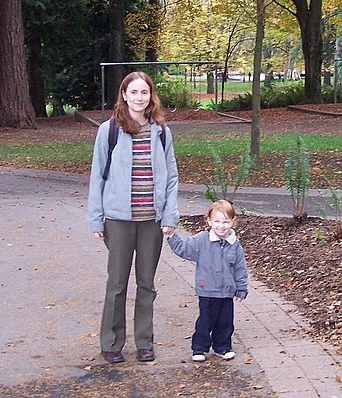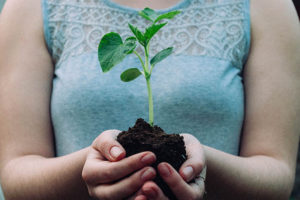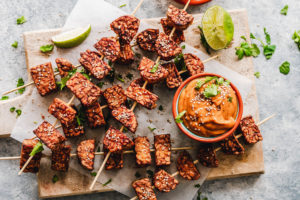Our task must be to free ourselves by widening our circles of compassion to embrace all living creatures and the whole of nature in its beauty.
Albert Einstein
I’ve been vegan since 2000 and have a 15 year old son. He reports that he is grateful to have been raised vegan – which included about 2.5 years of nursing – and expects to remain vegan. Below are ten reasons that help explain why I decided to raise my child vegan, and why I would do the same again were I to have another child.
1. Because veganism is an expression of my creed, which embraces philosophy as the love of learning and of wisdom. I want to live with integrity and to lead an examined life that I can feel good about, or at least not ashamed of now, tomorrow, and whenever my life comes to an end. While our species has made a lot of ethical progress in many ways, in some ways, we are still living in a dark age. I am deeply concerned about the state of education, broadly construed, and trying to do my part to help bring about a much-needed twenty-first century Enlightenment. As part of my efforts there, I support the philosophy for children movement, which I see as part of a broader philosophy for all movement that I hope you’ll help me build. Like other parents, I am a fallible being, attempting (and often failing) to raise my child in keeping with my own best judgment. Fortunately, his father is also very much on board.
2. Because Darwin. Humans are interdependent social animals who have evolved on a planet that we depend upon for our survival. It is also the one and only home of a multitude of other animals, tragically many of whom are going extinct. I aim to work towards and live by a defensible, sustainable, and evolving ethical position. I believe that when we recognize that and why sexism, racism, classism, ableism (and so on) are wrong, the same underlying reasoning also leads us to the conclusion that it is wrong for humans to arbitrarily abuse power over other animals. That does not entail that “all animals are equal,” whatever that might mean. We need not go that far to recognize that humans are not the only animals whose interests are morally significant. It is common for people to respond that we should take care of human problems first. As we continue to learn more, however, it becomes increasingly clear that we need not and should not set aside concern for other animals as we take on other pressing problems.
Consider, for instance, that those who hold bigoted views about nonhuman animals are more likely to hold racist, sexist, and other bigoted views about different groups of humans. (See, for example, this essay and this study.) For related reasons, we often say of an especially kind person that he or she “would not hurt a fly.”
I am raising my son vegan because so far as I can tell, given the sorts of beings we are and might become – homo (wannabe) sapiens – if we want our children to become empathetic adults and responsible citizens, it is best to raise them in environments in which care for others is normalized, and abuses to others – including other animals – are taken seriously. (See, for example, this news report.) The way we’re living now is already causing tremendous harm and set to significantly worsen unless we change course. I love my son and care about his future. That is, in part, why we are vegan.
3. Because bullying and betrayal hurt. As a child, growing up with undiagnosed autism, I felt most safe and relaxed in the company of animals. As with many autistic children, I was bullied, which sometimes included having my red hair pulled and ridiculed. On my way home from school, I would walk past a barn that was occasionally left unlocked. On those lucky days, I’d visit the horses who lived there, each in a small individual still, which struck me as gruelingly boring. One of the horses, who I identified with the most, had hair the same colour as mine. I would lean right up against her stall. I would look at her and at the other beautiful, sad looking horses with awe and feel something big. Huge. Spiritual. We would connect across the walls that separated us. Thoughts of my abusive peers would fade and I would calm down as I watched the horses’ bellies moving in and out, and in and out, and in and out. I would give them hay, and sometimes reach out my hand, slowly, to see if my touch was welcome. It often was. I’d rush home feeling a lot better, especially because my best friend, a collie named Lady, would be excited to see me, and in need of a walk. Lady was my furry four-legged diary. She was the only person I fully opened up to, and the only person I told about the bullying I was facing at school. We were there for each other. A team. The more we learn – with every passing year – the more we discover that even such seemingly simple beings as fish and chickens have their own unique personalities and preferences. The more we learn, as well, the more we know that the vast majority of animal products come from cruel practices. We know, too, that the few animal products that come from much better places also betray the animals they claim to care about, though there is rarely a genuine need to do so. I’m raising my son vegan because I know what it’s like to be betrayed by someone I trust and care about, and to be on my own, afraid and devalued, not because I did something wrong, but because I’m different.
4. Because a vegan diet can be a healthy choice. Mainstream dietetic associations agree that, as the American Dietetic Association says, “appropriately planned vegetarian diets, including total vegetarian or vegan diets, are healthful, nutritionally adequate, and may provide health benefits in the prevention and treatment of certain diseases. Well-planned vegetarian diets are appropriate for individuals during all stages of the lifecycle, including pregnancy, lactation, infancy, childhood, and adolescence, and for athletes.” Before I decided to raise my son vegan, I did my homework and found that really, it isn’t all that hard to do. There is a lot of helpful guidance in works like Becoming Vegan by Brenda Davis and Vesanto Melina, both of whom are registered dietitians. The most recent Canadian Food Guide recommends a diet that is already primarily vegan by default.
5. Because I value truth and honesty and dislike hypocrisy. Most children love animals, and most parents would be rightly concerned if a child of theirs showed delight or callous disregard in response to a badly injured animal. Even so, children are routinely fed a load of lies – including lies of omission – packed right into their favourite foods. They are fed products with clear and known links to cruelty and climate change even as they are told to be kind and that we need to be good stewards of the Earth. When they are toddlers, we take our children to libraries and sign out books that misrepresent where animal products come from. When they go to school, they are given more lies: dated, debunked information, sometimes funded by Big Ag. Even now, children are often taught at school that animal products are necessary for health, and taught to believe that those products come from happy animals, living on idyllic farms. As someone wanting to teach my child to care about the truth, and to become an informed and responsible citizen, I take it as my job to help him see behind such veils. Our children deserve better, honest books, and accurate (child-appropriate) information. I agree with Maxim Gorky that “You must write for children the same way you write for adults, only better.” I believe that same thinking extends outwards as well, far beyond writing. I am raising my child vegan because I know what it’s like to discover unthinkable horrors behind my (formerly) favourite foods.
6. Because I want to teach my child to stand up for what is right, even if that sometimes means standing alone. I am raising my son vegan because I want him to become a man who knows, to the core of his being, that it is wrong to chase after pleasure, popularity, or profit by preying on vulnerable others. (See for example this news article, this essay, and this sad and harmful mixture of sexism and foolish, heart-attack-producing approaches to being a man.)
7. Because habits matter. In the Nicomachean Ethics, Aristotle quotes the poet Evenus, who says that “habit is but long practice, friend, and this becomes one’s nature in the end.” Habits can be hard to break. When we are faced with inconvenient and ugly truths about some of our bad habits, it is common for us to become defensive. It can be difficult to face the light, and then, to go against our problematic but customary ways, and implement what we’ve learned. Sometimes, we might even attack the messenger of important news that isn’t easy for us to hear. Defensiveness can be especially strong when it comes to habits as intimate and central to our lives as our diets, which are a big part of our relationships and our special occasions. I am raising my child vegan because I believe it is in his best interests to be educated into habits and rituals that are defensible and help him to live an ethical, responsible, and flourishing life.
8. Because I can. I didn’t find it hard to create a satisfying vegan diet in small town Ontario two decades ago, and it’s a whole lot easier to do so today, especially in a city like Vancouver. We are definitely not wealthy, but we’re still blessed with an over-abundance of options to choose from. Some of our favourite foods include stir-frys, marinated Portobello mushrooms, smoothies, fresh spring rolls, burritos, tacos, subs, spaghetti, Pad Thai, sushi, salads, pitas and hummus, chana masala, dal, gnocchis, pizza, soups, veggie burgers, veggie dogs, scrambled tofu, and fresh fruit with soy yogurt. There are also plenty of (sometimes accidentally) vegan desserts and junk foods for treats: ice creams, French fries, onion rings, chocolates, cake, chips, candy, donuts, cinnamon rolls, and more.
9. Because no one should have to work in or live by a slaughterhouse. Jobs in slaughterhouses are among the worst jobs and have among the highest rates of employee turnover. Few people want to work in a slaughterhouse. Those who end up with such jobs are often especially vulnerable. Given the horrendous nature of the work involved, slaughterhouse jobs can lead to PTSD in those tasked with killing countless animals to meet the public’s greedy and harmful demand for meat, milk, dairy, and eggs. Not surprisingly, factory farms and slaughterhouses are often located in, and further degrade, already poverty-stricken and downtrodden areas. Also not surprisingly, given the sorts of beings we are, when a slaughterhouse enters a community, rates of domestic abuse and crime in that area tend to rise. (See, for example, this article and this study.)
10. Because real health is holistic and mindful of future generations. I believe that how we break bread says a lot about who we are and who we want to be. What is a healthy diet? A diet that requires us to pretend to be o.k. with things we know to be wrong? A diet that deforms our character while also damaging our environment? A diet that abuses animals and harms other humans too? A truly healthy diet – the sort we all deserve, and that should be available to everyone – is a diet that we can justifiably feel good about. It is a diet that is sustainable and good for our bodies and our minds, good for our hearts, good for our communities, good for all of the farmers and workers involved, and good for the world at large. A truly healthy diet is the sort of diet that I want my son to gain his nourishment from as he takes on the many projects of his life. It is the sort of diet I want him to enjoy with a community of loved ones as he celebrates birthdays and graduations and weddings and other special occasions.
I am raising my son vegan as that is the position that matches my values and best judgment. I believe it to be in his best interests, and, as part of that, in the best interests of the children he may someday have. Drawdown presents following a plant-based diet as perhaps the most significant thing that we can do as individuals in response to the major threats posed by climate change. Of course, a vegan diet is not enough on its own, but it is enough to make a big difference; “Few climate solutions of this magnitude lie in the hands of individuals or are as close as the dinner plate.” Please, then, if you haven’t already, consider joining me and my son, and many, many others, and come on board.




